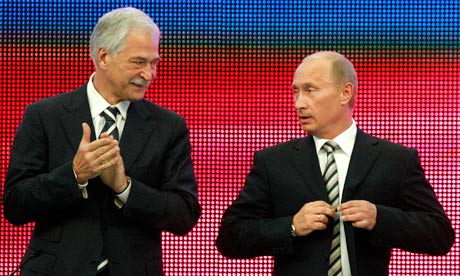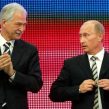
Surkov and Gryzlov: Russia’s New Negotiators on Ukraine (Part Two)
Publication: Eurasia Daily Monitor Volume: 13 Issue: 36
By:

*To read Part One, please click here.
Russia’s new representative in the Minsk Contact Group “on the implementation of the peace plan in the East of Ukraine,” Boris Gryzlov, has been closely associated with President Vladimir Putin for nearly 20 years, since Putin was still working in St. Petersburg. The new envoy takes over this assignment with an enhanced status as presidential plenipotentiary. Putin’s appointment of Gryzlov parallels the assignment of Putin’s aide Vladislav Surkov to operate the Russian side of the backchannel with Washington, in which Ukraine and Syria are being discussed as a package. Both envoys replace professional diplomats from the Ministry of Foreign Affairs in those roles. The Kremlin is taking over control of the negotiations from the foreign ministry in these two negotiating formats, while Foreign Minister Sergei Lavrov continues to represent Russia in the “Normandy” format (see Part One, in EDM, February 19).
Gryzlov headed the pro-Putin political organization Yedinstvo, first in St. Petersburg and then in Russia’s State Duma (1999–2001), the direct precursor to the Yedinaya Rossiya (United Russia) party of power. Gryzlov was internal affairs minister in 2001–2003, and retains, from that time to date, the status of a permanent member of Russia’s Security Council. Gryzlov became Yedinaya Rossiya’s leader and the State Duma’s chairman for two consecutive terms (2003–2011) and chairman of the board of the nuclear energy holding Rosatom (2012 to date). He takes over the Minsk Group assignment from Azamat Kulakhmetov, Russia’s former ambassador to Syria, who continues serving under Gryzlov in the Minsk Group (Kommersant, January 17).
The new envoy practically invited himself to Kyiv for talks with President Petro Poroshenko, on January 11. Gryzlov (just like Surkov) is blacklisted by the European Union, the United States and Ukraine, as part of sanctions over Russia’s annexation of Crimea (prior to Russia’s military intervention in Ukraine’s east, for which they are also co-responsible). Gryzlov’s landing at Kyiv airport also breached Ukraine’s ban on Russian civilian flights in Ukraine’s airspace and their use of Ukrainian airports (Russia has similarly banned Ukrainian flights). Moscow achieved a precedent-setting breach of personal sanctions affecting its top officials. Apart from this, Moscow is asking Kyiv to negotiate about Ukraine’s southeast with a Russian official who has been sanctioned internationally precisely for his role in the seizure of Ukrainian territory. But the Ukrainian government evidently felt that it could not afford to refuse this visit.
Gryzlov’s Kyiv visit amounted to bypassing the Minsk Contact Group, to which he is accredited. On Putin’s behalf he carried some new proposals for discussion with Kyiv bilaterally, without having submitted them in the multilateral Minsk Group. This move could also be seen as attempting to bypass Donetsk-Luhansk (which are represented in the Minsk Group) and offer a more salable deal to Ukraine, without Donetsk-Luhansk’s co-authorship, even if pre-consulted with them.
According to some Kyiv insiders, Gryzlov outlined a “road map” toward the implementation of the Minsk Two armistice, asking Ukraine to undertake the following steps in this order: enact a general amnesty law for war-related crimes in the Russian-controlled territory; negotiate and agree with Donetsk-Luhansk on a law for local “elections” to be staged in that territory; validate those elections’ outcome, and bring the law on the “special procedures for local self-government” in that territory into effect; and finally, enshrine that law in Ukraine’s constitution (Moscow would accept adding that amendment to the constitution’s transitory provisions, not necessarily the body of the text).
Those are preconditions to allowing Ukraine to restore control of its own side of the Ukraine-Russia border in the Russian-controlled territory (under the Minsk armistice, Ukraine is supposed to negotiate with Donetsk-Luhansk about some form of joint control of that border). With this, Moscow would hope to see the start of discussions with the European Union about easing the economic sanctions. Notably, Gryzlov (Moscow) showed no interest in quibbling about the special electoral law for local elections in Donetsk-Luhansk—a matter left to the Minsk Group entirely (Dzerkalo Tyzhnya, January 15–21; Apostrof, February 5).
President Poroshenko minimized publicity around Gryzlov’s visit before going public himself with his counter-proposals on national television. Without mentioning Gryzlov’s roadmap, Poroshenko outlined what amounts to Ukraine’s roadmap, with its own sequence of steps: a reasonably lengthy period of a full ceasefire, with full and unimpeded access for the monitoring operation; withdrawal of illegally stationed forces from the Donetsk-Luhansk territory; restoration of Ukraine’s control on its side of the border (alternatively, deployment of an international contingent of police personnel along the border). No valid elections could be held in Donetsk-Luhansk without those basic security guarantees (Ukrinform, January 24).
Hardly anyone in Kyiv harbors illusions that Moscow would accept those proposals and that chronological sequence. Kyiv seeks to forestall a possible Western imposition of sham elections in the Russian-controlled territory. Such elections would, in the existing circumstances, guarantee the success of Russia’s proxies and legitimize the Donetsk and Luhansk “people’s republics.” The Minsk Contact Group is currently debating the technical modalities for such elections, in the absence of basic security conditions, let alone a legal and democratic environment.
A meeting of the Minsk Group is scheduled to be held on February 24, after a month-long hiatus. According to Ukraine’s delegate, Roman Bessmertnyy, the negotiations are not afloat, but “sinking below the water line” in terms of security guarantees for any political process (Apostrof, February 22).




